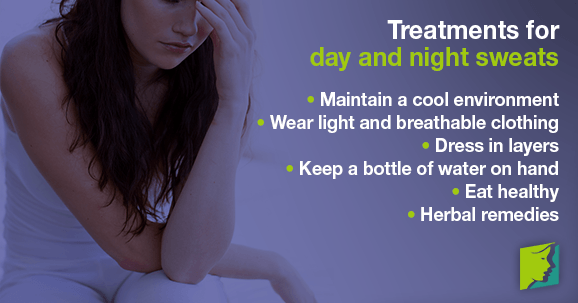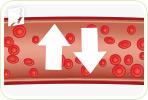While some sweating is normal, excessive sweating can be a problem - especially for menopausal women.
Hot Flashes and Night Sweats
Sweating in menopausal women is usually the result of hot flashes. Hot flashes occur when estrogen levels dip, giving the hypothalamus insufficient stimuli. This can make the brain confused about the body's internal temperature, and cause it to warm itself up. When it realizes that its overheating, it tries to cool down by sweating.
Some common symptoms of hot flashes include:
- Flushed or warm skin
- Nausea
- Headache
- Rush of intense heat
- Rapid or irregular heartbeats
- Chills
- Profuse sweating
When hot flashes occur at night, they're called night sweats, because the resulting sweat often soaks though clothing and bed sheets.
Managing Day and Night Sweats
When day and night sweats begin to negatively impact your life, it's time to seek treatment. There are a number of options available, including:
Maintain a cool environment. Open windows, turn on a fan or air conditioning.
Wear light and breathable clothing. Certain fabrics (cotton, linen, silk) are more breathable than others (polyester, nylon, spandex) and can help your body maintain a comfortable temperature throughout the day.
Dress in layers. Wearing layers can make it easy to shed if you start overheating, or add layers when cold, regulating body temperature.
Keep a bottle of water on hand. Whether an ice pack, water, or even ice cream, keeping something cold on hand can help regulate body temperature.
Eat healthy. Hot flashes are caused by hormonal imbalance leading to confusion of the body temperature, so eating the right kind of food and making sure you get all your necessary vitamins and nutrients to stimulate hormone production is essential.
Alternative medicine. There are a variety of types of alternative medicines that may help you control hot flashes and night sweats. Some herbal remedies containing phytoestrogenic and non-estrogenic herbs may be able to help stimulate hormone production or mimic hormones in the body. Other options involve things like acupuncture, which many women claim works well for reducing hot flashes. When choosing whether or not to try alternative medicines, always make sure to read up on the medicine to make sure it doesn't have side effects or negative interactions with medicines you are currently taking.
More Information about Day and Night Sweats
If you are ever concerned about your health because of hot flashes and night sweats, talk to your doctor. There are a number of other procedures that can be done to reduce menopausal symptoms, and you can discuss the risks and benefits of them with a medical practitioner.
For more information on night sweats and hot flashes please click the following link.
Sources
- The National Institute of Health. "Signs of the Menopausal Transition" www.nih.gov
- Boston Women's Health Collective. "Hot Flashes, Night Sweats and Sleep Disturbances". Our Bodies, Ourselves, 2006.
- Von Muhlen, DG, et al. "A community-based study of menopause symptoms and estrogen replacement in older women". Maturitas. Sept 1995; 22(2):71-8.




